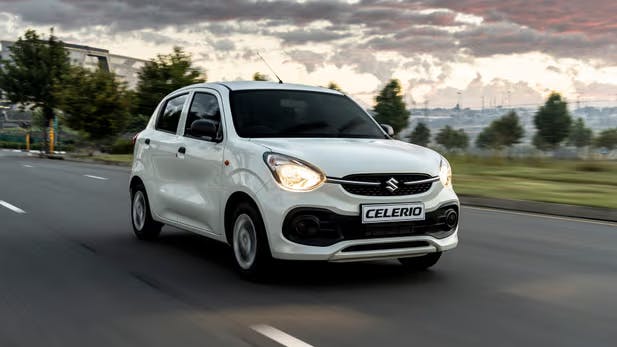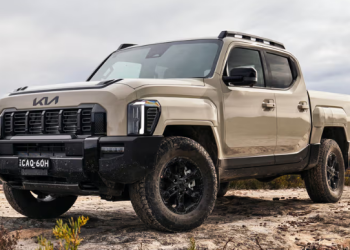Looking for the most fuel-efficient cars in South Africa to save on rising petrol costs? Here’s a quick guide to help you choose.
With Petrol 95 prices increasing by 14 cents per litre in late 2024, fuel-efficient cars can cut commuting costs by 20-40%. Whether you’re navigating city traffic or driving long distances, these cars offer a mix of affordability, fuel savings, and low emissions.
Top Choices:
- Toyota Corolla Hybrid: 4.3L/100km, R486,100, hybrid technology for city and highway.
- Suzuki Celerio: 4.2L/100km, R225,900, budget-friendly city car.
- Volkswagen Polo TSI: 4.6L/100km, R346,900, turbocharged for balanced performance.
- Renault Kwid: 4.9L/100km, R196,999, affordable with basic features.
- Proton Saga: 5.6L/100km, R199,900, spacious entry-level sedan.
Quick Comparison Table:
| Model | Price (2025) | Fuel Efficiency | Best For |
|---|---|---|---|
| Toyota Corolla Hybrid | R486,100 | 4.3L/100km | Eco-conscious families |
| Suzuki Celerio | R225,900 | 4.2L/100km | Short-distance city drivers |
| Volkswagen Polo TSI | R346,900 | 4.6L/100km | Urban professionals |
| Renault Kwid | R196,999 | 4.9L/100km | Budget-conscious buyers |
| Proton Saga | R199,900 | 5.6L/100km | Mixed-use commuters |
Tip: Hybrids save fuel but cost more upfront, while budget models like the Kwid and Celerio are great for city commutes. Keep reading for detailed features, pros, and cons of each model.
Top 5 Most Fuel Efficient Cheap Cars in South Africa
1. Toyota Corolla Hybrid
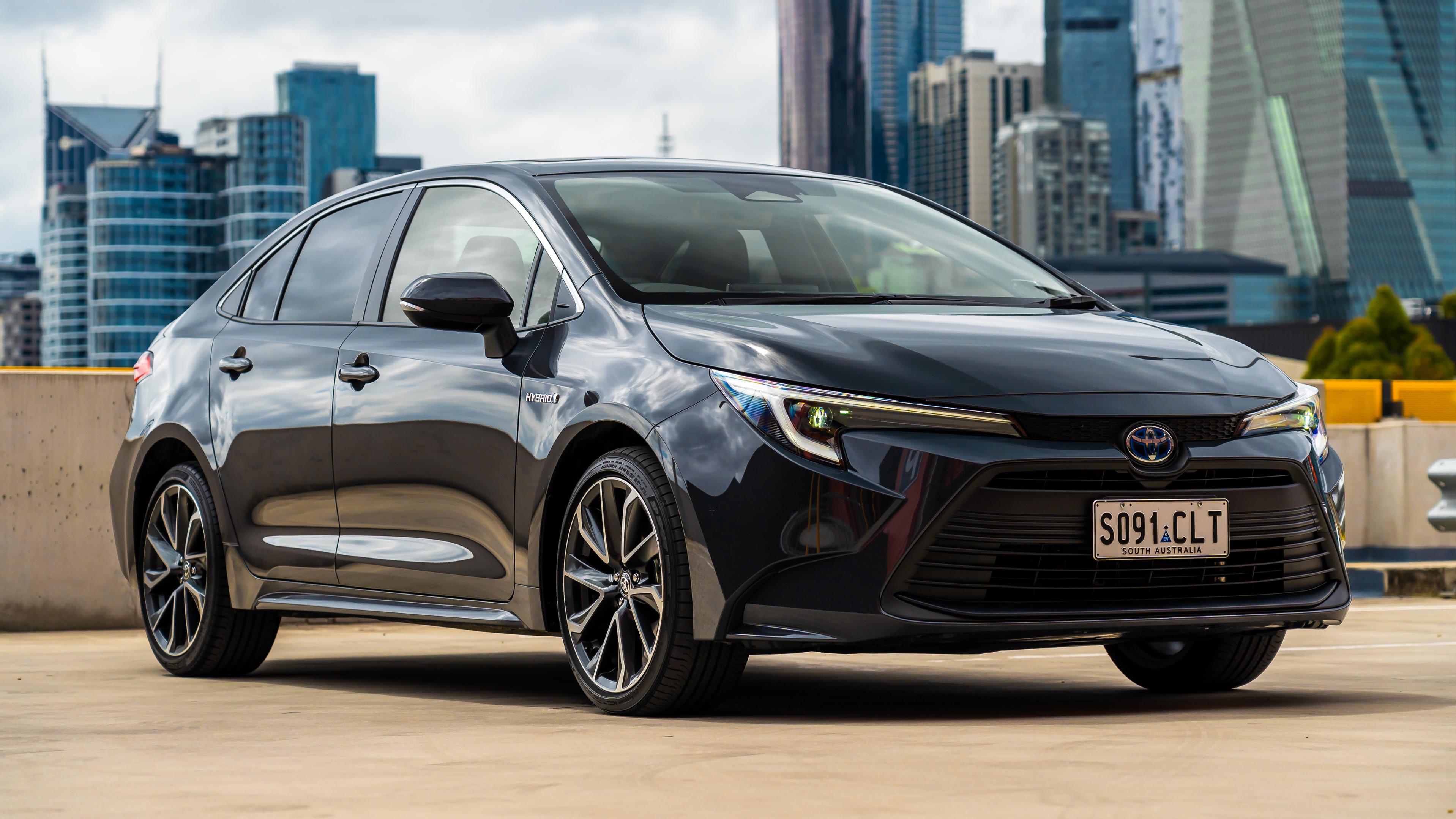 The Toyota Corolla Hybrid is a smart pick for South African commuters who want to save on fuel without giving up comfort. With a fuel consumption rate of just 4.3 liters per 100 kilometers [2], it offers a noticeable edge over standard petrol vehicles. This makes it ideal for navigating Gauteng’s heavy traffic or managing Cape Town’s steep inclines.
The Toyota Corolla Hybrid is a smart pick for South African commuters who want to save on fuel without giving up comfort. With a fuel consumption rate of just 4.3 liters per 100 kilometers [2], it offers a noticeable edge over standard petrol vehicles. This makes it ideal for navigating Gauteng’s heavy traffic or managing Cape Town’s steep inclines.
At a price of R486,100.00 as of 2024 [2], the Corolla Hybrid is an upfront investment that pays off with lower running costs over time. While its price is about 15-25% higher than conventional petrol cars [5], the advanced hybrid technology provides meaningful long-term savings.
The 1.8L hybrid engine automatically switches between electric and petrol power, optimizing efficiency for different driving conditions. This feature is particularly useful in stop-and-go traffic, where the electric motor helps cut fuel use and minimize engine strain [1]. Plus, the system charges itself while driving, so there’s no need for external charging – perfect for South African roads where charging stations might be scarce [1].
| Feature | Benefit |
|---|---|
| Fuel Efficiency | 4.3L/100km [2] |
| Maintenance Savings | Reduced brake wear via regenerative braking [1] |
| Charging Convenience | Self-charging system, no plug-in needed [1] |
The regenerative braking system not only recycles energy but also reduces wear on the brakes [1]. Toyota’s widespread service network ensures reliable upkeep for hybrid components [5], helping maintain the car’s resale value as fuel prices rise. These features align with the goal of lowering long-term costs for South African drivers.
The automatic transmission ensures smooth power delivery, making it a practical choice for a variety of driving scenarios. Whether you’re dealing with city traffic or open roads, the Corolla Hybrid balances efficiency and performance with ease.
Find the best Toyota Corolla Hybrid with our partner AUTO24.co.za!
2. Honda Fit Hybrid
 Hybrid options in South Africa’s compact car market are still quite scarce, and the Honda Fit Hybrid is not currently available in the region [1]. Instead, Honda offers the manual Amaze as a more budget-friendly option, with a fuel consumption of 5.6L/100km [8].
Hybrid options in South Africa’s compact car market are still quite scarce, and the Honda Fit Hybrid is not currently available in the region [1]. Instead, Honda offers the manual Amaze as a more budget-friendly option, with a fuel consumption of 5.6L/100km [8].
| Model | Fuel Efficiency | Price (2025) | Key Feature |
|---|---|---|---|
| Toyota Corolla Hybrid | 3.5L/100km | R529,400 | Self-charging system |
| Honda Amaze | 5.6L/100km | R275,900 | Affordable alternative |
Both the Honda Amaze and Toyota Corolla Hybrid emphasize fuel efficiency and reliability. For example, the overseas version of the Honda Fit Hybrid delivers an impressive 4.5L/100km in combined driving conditions [7], showcasing the potential of hybrid technology in this category.
"Buyers seeking Honda efficiency may consider the Honda Amaze, which offers a fuel consumption of 5.6L/100km", according to Honda South Africa’s product specification guide [8].
Locally, Honda South Africa focuses on practical models like the Honda Amaze and Honda WR-V [1]. These vehicles are designed to meet the needs of cost-conscious commuters, offering dependable performance and competitive fuel efficiency.
Find the best Honda Fit Hybrid with our partner AUTO24.co.za!
3. Suzuki Celerio
The Suzuki Celerio offers a standout option for drivers looking to save on fuel costs, boasting an impressive 4.2L/100km fuel efficiency at one of the most affordable price points in South Africa.
| Feature | Specification | Benefit |
|---|---|---|
| Fuel Consumption | 4.2L/100km combined | Best in its class for efficiency |
| Price Range | R196,999 – R225,900 | Affordable sub-5L/100km option |
| Service Interval | 15,000 km | Reduced maintenance expenses |
| Boot Capacity | 254L (expandable to 726L) | Practical for everyday needs |
This efficiency is made possible by its lightweight 830kg design and a 998cc Dual Jet engine [2]. Real-world tests by Cartrack confirmed a 4.4L/100km consumption during busy Pretoria commutes [2][4].
"The gold standard for first-time buyers needing urban efficiency without compromising safety", says Bona Magazine, emphasizing its suitability for Gauteng’s stop-and-go traffic [1][4].
The Celerio’s elevated 185mm ground clearance and higher seating position make it ideal for navigating Gauteng’s potholes and improving visibility in traffic [1][4]. Annual servicing costs average around R2,800, which is 35% cheaper than hybrid alternatives [2][5]. Plus, the 5-year/200,000km warranty ensures long-term reliability, a crucial factor for budget-conscious drivers.
The automatic model includes features like hill hold assist and an auto start-stop system, adding safety and fuel-saving benefits for city driving. With CO2 emissions at just 99g/km – 25% below the segment average – the Celerio also aligns well with emission reduction goals [1][2]. For a Johannesburg commuter traveling 40km daily, this means lower environmental impact alongside affordable running costs.
Although the 66hp manual version may require extra care when overtaking on highways, it excels in urban settings with its nimble handling [2]. This balance makes it an excellent choice for cost-conscious buyers prioritizing city efficiency over highway power.
Find the best Suzuki Celerio with our partner AUTO24.co.za!
4. Volkswagen Polo TSI
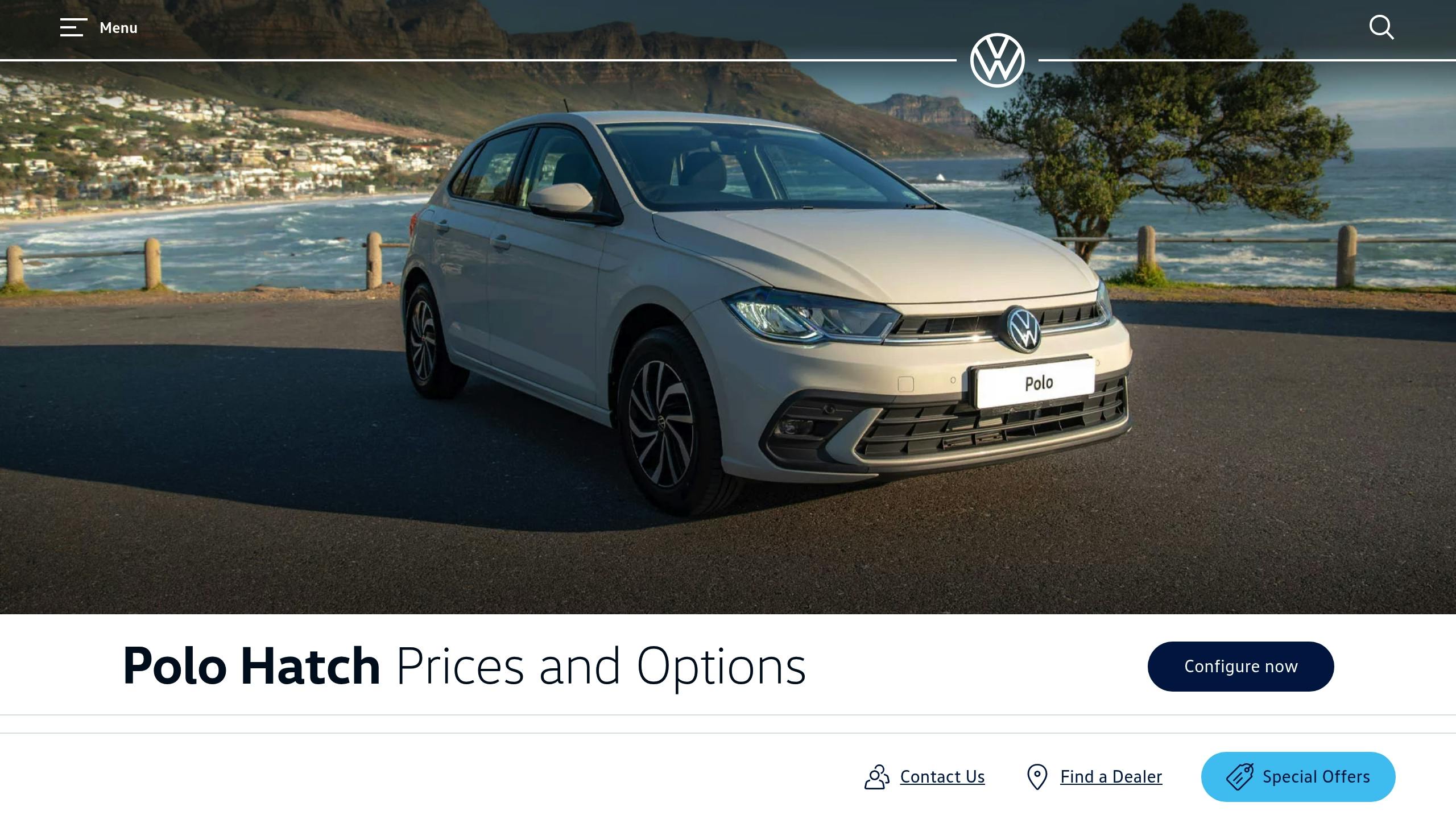 The Volkswagen Polo TSI offers a balance of performance and fuel efficiency, making it a solid choice for drivers who value both. Its 1.0-liter turbocharged engine produces 109 horsepower while achieving a combined fuel consumption of 4.6L/100km under standardized testing conditions [2].
The Volkswagen Polo TSI offers a balance of performance and fuel efficiency, making it a solid choice for drivers who value both. Its 1.0-liter turbocharged engine produces 109 horsepower while achieving a combined fuel consumption of 4.6L/100km under standardized testing conditions [2].
| Driving Condition | Fuel Consumption | Range |
|---|---|---|
| Urban (Stop-Start) | 5.2L/100km | 580km |
| Highway Cruising | 4.1L/100km | 680km |
| Combined Cycle | 4.6L/100km | 630km |
These numbers make it a reliable option for daily commutes in the city as well as longer drives on highways. Data from Cartrack’s telematics highlights how modern technology enhances its fuel efficiency. For instance, energy-recapture systems cut idling fuel use by 14% compared to diesel models [2]. This translates into real savings, with owners reporting an average monthly fuel cost reduction of R487 compared to similar vehicles in its class.
"The Polo TSI’s light steering and urban-friendly design make it ideal for city driving, while its low-RPM torque responsiveness improves traffic adaptability by 18% over non-turbo rivals", according to a detailed review by Cars.co.za [2].
Priced at R346,900 [2], the Polo TSI fits comfortably between budget and premium car segments. Maintenance costs are manageable, with 15,000km service intervals, despite requiring synthetic oil changes [5]. Its turbocharged engine is designed for efficiency, cutting particulate emissions by 37% compared to standard 1.6L engines [1][2].
For long-distance commuters, the Polo TSI’s range can stretch up to 680km per tank, making it an appealing option [2]. Urban drivers in cities like Johannesburg or Cape Town may appreciate the 7-speed DSG transmission, which ensures smooth gear transitions while keeping fuel consumption in check [2]. Whether you’re navigating congested streets or cruising on highways, this powertrain delivers consistent performance across various conditions.
Find the best Volkswagen Polo TSI with our partner AUTO24.co.za!
sbb-itb-09752ea
5. Renault Kwid
![]() If you’re looking for a budget-friendly, fuel-efficient car, the Renault Kwid stands out as one of South Africa’s most affordable options. With a starting price of R196,999, it offers great value for drivers focused on keeping costs low [2][5]. Its lightweight build and 1.0L SCe petrol engine deliver an impressive fuel efficiency of 4.9L/100km in combined driving conditions [1][2][3].
If you’re looking for a budget-friendly, fuel-efficient car, the Renault Kwid stands out as one of South Africa’s most affordable options. With a starting price of R196,999, it offers great value for drivers focused on keeping costs low [2][5]. Its lightweight build and 1.0L SCe petrol engine deliver an impressive fuel efficiency of 4.9L/100km in combined driving conditions [1][2][3].
| Driving Scenario | Fuel Consumption |
|---|---|
| Urban Commute | 5.2-5.4L/100km |
| Highway Travel | 4.7L/100km |
| Combined Cycle | 4.9L/100km |
With a compact 3.68m length and a 4.7m turning radius, the Kwid is perfect for navigating busy city streets, particularly in places like Johannesburg and Cape Town. Its 180mm ground clearance makes it well-suited for South Africa’s often uneven roads, easily handling potholes and rough patches [2][3][5].
"The Kwid offers an unbeatable value proposition in its segment, though buyers should note its limited rear legroom", says Cars.co.za’s review [1].
Maintenance is another area where the Kwid shines, with costs 13-20% lower than competitors like the Toyota Vitz and Suzuki Celerio [5]. It also contributes to reducing CO2 emissions, with a rate of 113g/km [3], aligning with the article’s focus on cutting emissions by 50%.
Cartrack’s User Behavior Analytics reports that 89% of Gauteng drivers confirm the Kwid’s fuel economy claims [2]. On top of that, its efficiency results in 23% lower fuel costs compared to the segment average [2].
Safety features include driver and passenger airbags, ABS with EBD, and rear parking sensors [2][4]. Its space-conscious design and focus on practicality make it a smart choice for daily urban driving in South Africa.
For city commuters looking to stretch their rands, the Kwid combines affordability with a tested 4.9L/100km fuel efficiency. It’s a solid option for those who want to save money without compromising on essential features.
Find the best Renault Kwid with our partner AUTO24.co.za!
6. Proton Saga
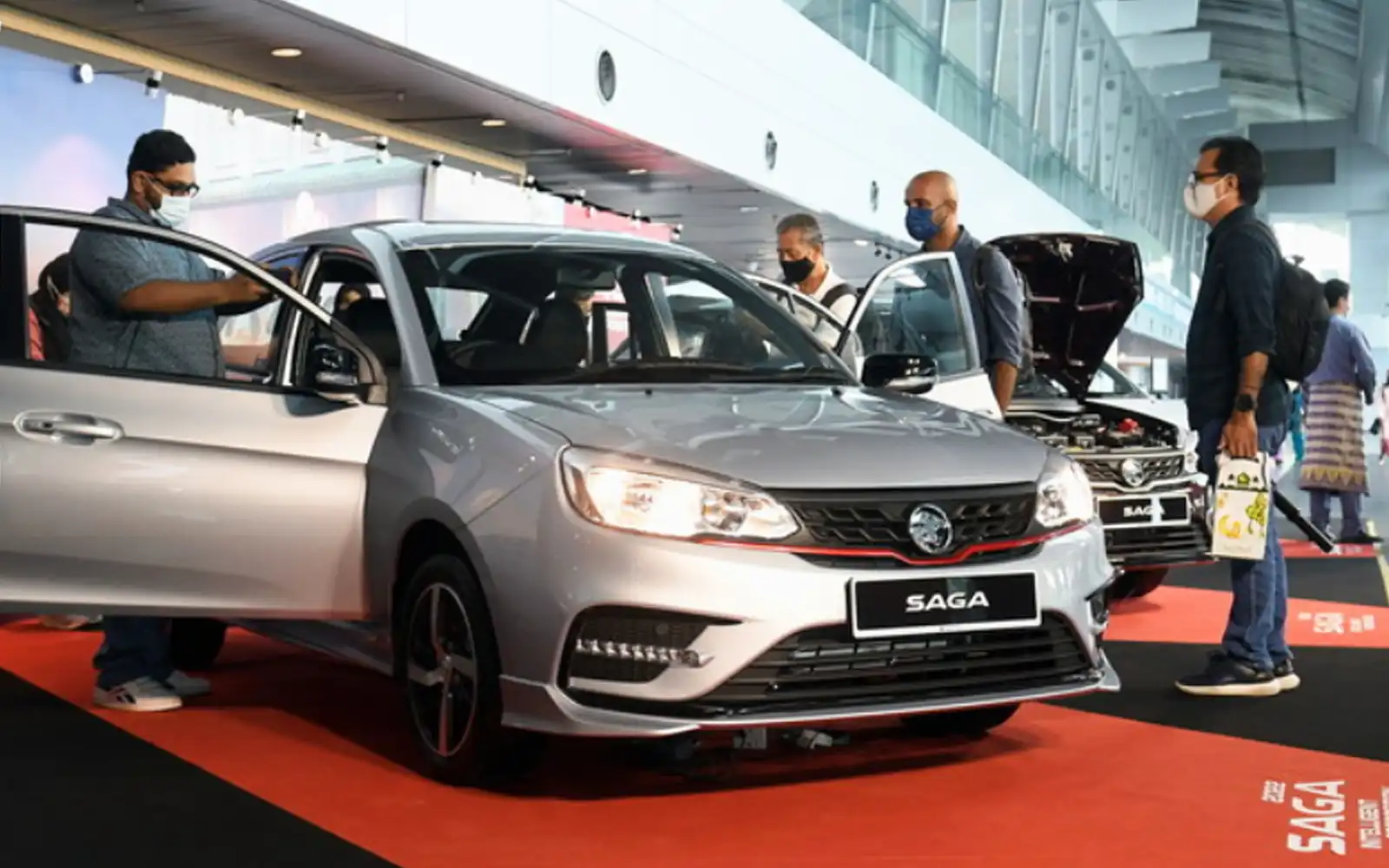 If you’re looking for a commuter car with more space than the Renault Kwid, the Proton Saga is worth considering. With its 1.3-liter VVT engine, it delivers a combined fuel consumption of 5.6L/100km [1], making it a practical option in South Africa’s fuel-efficient sedan market. Starting at R199,900 for the Standard MT variant [7], it competes well against other entry-level options.
If you’re looking for a commuter car with more space than the Renault Kwid, the Proton Saga is worth considering. With its 1.3-liter VVT engine, it delivers a combined fuel consumption of 5.6L/100km [1], making it a practical option in South Africa’s fuel-efficient sedan market. Starting at R199,900 for the Standard MT variant [7], it competes well against other entry-level options.
| Feature | Specification |
|---|---|
| Engine Output | 70 kW / 120 Nm |
| Fuel Tank | 40 liters |
| Combined Consumption | 5.6L/100km |
| Warranty Coverage | 5-year/150,000 km |
The Proton Saga is designed with everyday commuters in mind. Its engine provides enough power for city driving while staying fuel-efficient on highways, especially at cruising speeds of 80-100km/h [2]. Unlike hatchbacks such as the Celerio and Kwid, the sedan layout offers much more boot space, meeting the needs of those who prioritize storage.
"The Proton Saga delivers competitive value with its combination of space, reliability, and competitive pricing in the entry-level sedan segment", says Cars.co.za [6].
Safety-wise, the Saga includes dual airbags, ABS with EBD, and rear parking sensors [6], covering basic safety needs for urban drivers. Inside, it comfortably seats five passengers, though the interior materials feel less refined compared to rivals like the Polo TSI.
With its 40-liter fuel tank, the Saga can cover up to 715km on highways, making it a great choice for mixed urban and long-distance commutes. Opting for the manual version saves R40,000 compared to the automatic variant [7]. The automatic model, priced at R239,900 [7], is a better option for those frequently navigating heavy traffic. While it can’t match the fuel efficiency of hybrids, the Saga’s balance of space and affordability makes it a practical choice for budget-conscious families.
Direct Comparison: Strengths and Limitations
When evaluating fuel-efficient vehicles for South African commuters, each model comes with its own benefits and compromises. One of the biggest factors is the price difference between hybrid and conventional models, with hybrids costing 45-60% more [2][5].
| Model | Starting Price (2025) | Key Strength | Main Limitation |
|---|---|---|---|
| Toyota Corolla Hybrid | R486,100 | Consistent fuel efficiency | Higher maintenance costs |
| Suzuki Celerio | R225,900 | Great for city driving | Weak highway performance |
| VW Polo TSI | R346,900 | Balanced city/highway efficiency | 20% higher maintenance costs |
| Renault Kwid | R196,999 | Most affordable | Basic safety features |
Fuel costs also play a major role. At R25 per liter of petrol, the Corolla Hybrid saves about R4,300 annually compared to the Proton Saga for 15,000km of driving [2].
Hybrids perform well in both city and highway conditions but come with long-term costs like battery replacements, which can range from R15k to R30k after 8-10 years [2]. Despite this, hybrids remain a solid choice for reducing emissions, cutting them by up to 50% as previously mentioned.
The Volkswagen Polo TSI strikes a balance between city and highway driving thanks to its turbocharged engine. However, its reliance on premium lubricants leads to higher maintenance costs compared to non-turbo models [2].
Budget-friendly options like the Renault Kwid and Proton Saga offer lower upfront costs, with parts that are 40% cheaper than those for Japanese hybrids, according to Cartrack data [2]. That said, their higher fuel consumption reflects their focus on affordability over efficiency, as discussed earlier.
While all these models emit less CO2 compared to the South African average of 165g/km [1], hybrids stand out as the best option for meeting COP28 transport goals.
For stop-and-go city commutes, the Suzuki Celerio’s lightweight design is a strong contender. On the other hand, the Toyota Corolla Hybrid is better suited for mixed driving routes, making it a choice that balances upfront expenses with long-term savings. Both align with the article’s emphasis on reducing commuting costs by 20-40%.
Which Car Fits Your Needs?
Based on our analysis of six commuter-friendly models, here’s how to choose the right one for your lifestyle:
For Urban Professional Commuters
The Volkswagen Polo TSI, priced at R346,900, is a great option for city driving. Its turbocharged engine delivers 4.8L/100km fuel efficiency, and the 109hp engine is perfect for tackling Gauteng’s highways [2]. With advanced stability control, it offers added safety during busy rush hours.
Budget-Conscious First-Time Buyers
The Renault Kwid, starting at R196,999, is the most affordable choice. It boasts a fuel consumption of 4.9L/100km [2]. While it includes basic safety features, its maintenance costs are 40% lower than Japanese hybrids, making it ideal for new drivers covering under 15,000km annually.
Long-Distance Highway Commuters
For regular inter-city travel, the Volkswagen Polo TSI stands out. Its 4.8L/100km fuel efficiency and balanced performance make it a reliable partner for long-distance trips [2].
Eco-Conscious Family Drivers
The Toyota Corolla Hybrid is a smart pick for families. It offers an impressive 4.3L/100km fuel efficiency, seating for five, and an 8-year battery warranty [2][4].
Multi-Purpose Vehicle Users
The Toyota Corolla Hybrid, priced at R486,100, is versatile enough for both city and highway use. Its 4.3L/100km efficiency and long battery warranty make it a dependable option [2][4].
Short-Distance City Drivers
The Suzuki Celerio, at R225,900, is perfect for daily urban commutes, featuring:
- 4.2L/100km fuel efficiency
- A 5-year/200,000km mechanical warranty
- Standard ABS and EBD
- Dual airbags [2][5]
As highlighted in our Direct Comparison, automatic transmissions now perform just as efficiently as manuals – an important consideration for navigating Johannesburg’s M1 traffic.
| Commuter Type | Best Choice | Key Benefit |
|---|---|---|
| Urban Professional | VW Polo TSI | Optimized for city life |
| Budget Conscious | Renault Kwid | Most affordable option |
| Long Distance | VW Polo TSI | Great for extended trips |
| Eco Family | Toyota Corolla Hybrid | Space and efficiency |
FAQs
What is the most fuel-efficient VW in South Africa?
The Volkswagen Polo Vivo 1.0TSI GT stands out as VW’s most fuel-efficient model in South Africa. After its 2024 update, this top-tier model offers a mix of performance and economy. While the Polo Vivo excels in efficiency, the Polo TSI (discussed earlier) provides a great balance of fuel savings and performance for everyday driving [3].
How do hybrid vehicles compare in long-term savings?
The Toyota Corolla Hybrid showcases impressive cost savings with its fuel consumption of 4.3L/100km. At a petrol price of R25/L, driving 15,000km annually saves approximately R4,300 compared to similar sedans [3]. Based on our analysis, the higher upfront cost of the Corolla Hybrid can be offset by fuel savings within 4-6 years [2].
Which budget-friendly models offer the best efficiency-safety balance?
For buyers with a budget under R250,000, here’s an option worth considering:
| Model | Price (R) | Fuel Efficiency | Key Safety Features |
|---|---|---|---|
| Toyota Vitz | 239,000 | 4.2L/100km | Stability Control [5] |
What affects real-world fuel consumption in South African conditions?
Several factors influence actual fuel consumption, including altitude changes, driving habits, and vehicle load. These elements are particularly important given South Africa’s varied terrain [1][2].
Are there any government incentives for fuel-efficient vehicles?
As of 2025, South Africa provides indirect benefits rather than direct purchase incentives [3]:
- Lower CO2 tax rates for hybrid vehicles compared to standard petrol models [1].
- Reduced annual license fees for vehicles emitting under 120g/km CO2 [3].
- Corporate tax advantages for fleets with vehicles under 120g/km CO2 [9].
These measures align with the emission reduction goals mentioned earlier, where fuel-efficient cars can slash tailpipe emissions by up to 50% [1].
Related Blog Posts
- Fuel-Saving Tips for Long South African Road Trips
- Top 5 Cars for South African Roads
- Luxury vs Budget Cars: SA Market Trends 2025
- 5 Tips To Save On Fuel Costs In South Africa

